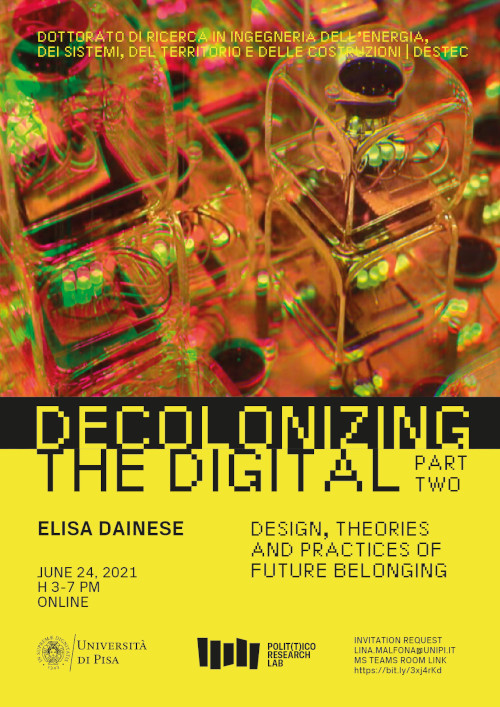Decolonizing the Digital. Part Two
Seminario dottorale con Elisa Dainese per il DESTEC
 Giovedì 24 giugno, alle ore 15,00, avrà luogo la seconda parte del seminario "Decolonizing the Digital: Design, Theories and Practices of Future Belongings" nell'ambito del DESTEC (Dottorato di Ricerca in Ingegneria dell'Energia, dei Sistemi, del Territorio e delle Costruzioni).
Giovedì 24 giugno, alle ore 15,00, avrà luogo la seconda parte del seminario "Decolonizing the Digital: Design, Theories and Practices of Future Belongings" nell'ambito del DESTEC (Dottorato di Ricerca in Ingegneria dell'Energia, dei Sistemi, del Territorio e delle Costruzioni).
Relatrice sarà Elisa Dainese.
Elisa Dainese è Assistant Professor presso il Georgia Institute of Technology e Visiting Fellow presso il laboratorio di ricerca Polit(t)ico dell'Università di Pisa (responsabile: professoressa Lina Malfona).
La prima parte del seminario, con Lina Malfona, ha avuto luogo lo scorso 25 giugno 2020.
Il seminario, aperto a docenti, studenti e dottorandi, si terrà in lingua inglese con interventi di docenti del Politecnico di Torino, dell'Università di Sheffield e dell'Università di Pisa.
Abstract
Starting from the definition of architecture as “political technology” (Felicity D. Scott, 2010), this seminar questions how and for whom digital technologies, services and structures are created and it explores which rights and restrictions make their architecture accessible. Through the investigation of questions at the intersections of theory and praxis and considerations on how tools can be theorized, hacked, and used in service of decolonization, the research challenges colonial epistemological legacies working towards decolonial futures of design. Results investigate the limits of anti-colonial, post-colonial and even decolonized theories on design to understand how renovated paradigms and approaches could build new social architecture and urban design.
[Immagine: The Universal Constructor, group project by students at the Architectural Association directed by John and Julia Frazer 1990]
Programma
Opening
Renato Iannelli, UniPi (PhD coordinator)
Introduction
Lina Malfona, UniPi
"The Call to Decolonize Architecture"
Relatrice: Elisa Dainese
Western canons have long been defining roots and origins of the architectural world determining its history and theory. While Eurocentric and North American paradigms have dominated the global scene for centuries, they have also controlled the reception of other architectural cultures, often dismissing and excluding their traditions and technologies to extend control over minor beings and contested spaces. The tension between a growing consciousness that we all live in an ongoing colonialist project and the uncertainty as to exactly what can be done about it has produced increasing discussions around the call to decolonize architecture. This presentation investigates how the framework of decolonization in architecture has challenged contemporary theories and design paradigms. Looking to the U.S., Canadian and African contexts, the lecture examines the origin of the decolonizing movement in architecture, different meanings and interpretations of the concept, and the complexity the notion offers in practical and theoretical terms.
Discussants: Camillo Boano, PoliTo; Phd student: Szymon Mateusz Ruszczewski (SSoA)
Decolonizing the Digital Space
Relatrice: Elisa Dainese
In the last decades, the world of information technology and digital communication and the construction of networks for managing information have seemed to be able to free both the Western and non-Western world promoting globalization and liberal economies. However, relying on the availability and approachability of expensive hardware and interfaces only accessible to a few, the adoption of digital technologies has demonstrated to be unable to solve the problem of a free access to knowledge and power. Instead it has added extra layers to existing and expensive systems requiring continuous knowledge expansion.
Starting from the definition of architecture as “political technology” (Felicity D. Scott, 2010), this presentation questions how (and for whom) tools, services, and structures are created. The lecture explores which rights and restrictions make their architecture accessible. Through the investigation of questions at the intersections of theory and praxis and by investigating how tools can be theorized, hacked, and used in the service of decolonization, the research challenges colonial epistemological legacies. With the goal of working towards decolonial futures of design, results investigate the limits of anti-colonial and post-colonial theories on design to illuminate how renovated paradigms and approaches could build new social architectures and digital spaces.
Discussant: Charles Batach, Kindom University; Phd student: Andrea Crudeli (UniPi)
Decolonizing Knowledge: Data, Archives and the Classroom
Relatrice: Elisa Dainese
In his book The Wretched of the Earth Fanon defines decolonization as “a program of complete disorder” (Fanon, 1963, 36). Several scholars from different disciplines has endorsed the fight against colonial violence aiming to recognize Indigenous land and cultural claims. In design terms participating in this project would imply a qualitative shift of recognition of minor narratives that might represent a critical revision of architectural theory and praxis as we know them.
This presentation focuses on the capacity of design thinking to make systematic forays beyond current, Western knowledge horizons. Discussing about sovereignty of data, archival decolonization, and pedagogical research the lecture questions the appropriation of decolonization as a metaphor. Results illuminate examples that rely on other epistemic traditions and focus on knowledge exchange, fair participation, equal access, and empowerment of subjects.
Discussants: Sergio Pace, PoliTo; Phd student: Gaia Ballatori (UniPi)
Conclusion
Marco Trisciuoglio, PoliTo

 24 Giugno 2021 15:00
24 Giugno 2021 15:00 